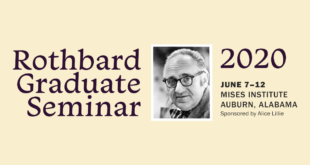[Excerpted from Chapter 17 of Human Action.] The services money renders are conditioned by the height of its purchasing power. Nobody wants to have in his cash holding a definite number of pieces of money or a definite weight of money; he wants to keep a cash holding of a definite amount of purchasing power. As the operation of the market tends to determine the final state of money's purchasing power at a height at which the supply of and the demand for money...
Read More »Reflections on the Rothbard Graduate Seminar
I had the good fortune of attending the Rothbard Graduate Seminar (RGS) twice in succession, during the summers of 2020 and 2021. By that time, I was already quite familiar with the ideas of the Austrian School thanks to the many podcasts and recorded Mises University lectures, among much more, the Mises Institute has made freely available online. However, I likely never would have realized my own understanding of Ludwig von Mises’s economic works was so deficient...
Read More »Privatizing Roads Solves the Problem of Road Closures
While traveling recently, I was stuck in a terrible bout of traffic. Unbeknownst to me, West Virginia University’s fall graduation just ended, and I was caught in the middle of the seemingly endless stream of parents, relatives, and friends who were leaving the ceremony. To deal with this problem, the City of Morgantown closed down lanes and reserved them for exclusive use by graduation attendees. Though the city may have done a fine job handling traffic, this raises...
Read More »When Nationalism Fuels Decentralization and Secession: Lessons from the Cold War
[This article is chapter 6 of Breaking Away: The Case for Secession, Radical Decentralization, and Smaller Polities. Now available at Amazon and in the Mises Store.] During the early 1990s, as the world of the old Soviet Bloc was rapidly falling apart, the economist and historian Murray Rothbard saw it all for what it was: a trend of mass decentralization and secession unfolding before the world’s eyes. The old Warsaw Pact states of Poland, Hungary, and others won...
Read More »Last Day to Give in 2023!
YOUR GIFT WILL HELP US DO MORE IN 2024. With your gift of $25 or more, you will receive a copy of Joe Salerno's The Progressive Road to Socialism. Recurring donors of $10 who give $100 will also receive a copy of The Progressive Road to Socialism and renew their Membership through 2024. DONATE TODAY! [embedded content] Tags:...
Read More »2023: A Year Reviewed
In this episode, Mark looks back at 2023 as a great year for the goals and prospects of the Mises Institute moving forward, but a very bad year for the State. Be sure to follow Minor Issues at Mises.org/MinorIssues. Get your free copy of Murray Rothbard's Anatomy of the State at Mises.org/IssuesFree. [embedded content]...
Read More »Sound Money Movement Strikes Gold in 2023
Against the backdrop of high inflation rates and geopolitical uncertainty, states are increasingly enacting measures that encourage saving in precious metals and even using gold and silver as money. With five bills signed into law in 2023, sound money reforms are gaining momentum across the United States. Money Metals Exchange’s Sound Money Defense League project has emerged as an influential force, actively engaging in legislative battles by prompting intense...
Read More »How the American Revolution Turned North American Foreign Trade on Its Head
[Chapter 1 of Rothbard's newly edited and released Conceived in Liberty, vol. 5: The New Republic: 1784–1791.] After peace came in 1783, the new republic faced a two-fold economic adjustment: to peacetime from the artificial production and trade patterns during the war, and to a far different trading picture than had existed before the war. The largest change between the two eras of peace was the shift in trading patterns resulting from independence. Most...
Read More »Time Is Running Out!
YOUR GIFT WILL HELP US DO MORE IN 2024. With your gift of $25 or more, you will receive a copy of Joe Salerno's The Progressive Road to Socialism. Recurring donors of $10 who give $100 will also receive a copy of The Progressive Road to Socialism and renew their Membership through 2024. Donate today! [embedded content] Tags:...
Read More »Central Banks Brought Inflation. Now they Bring Stagnation.
Although the Federal Reserve and the European Central Bank’s message regarding interest rate cuts seems clear, reiterating their commitment to reducing inflation, the market is expecting between five and six interest rate cuts, between 125 and 150 basis points, in the next twelve months. This shows us the bubble bias of many investors. We live in a world where two generations of market participants have only seen rate cuts and massive liquidity injections. Central...
Read More » Swiss Economicblogs.org
Swiss Economicblogs.org







